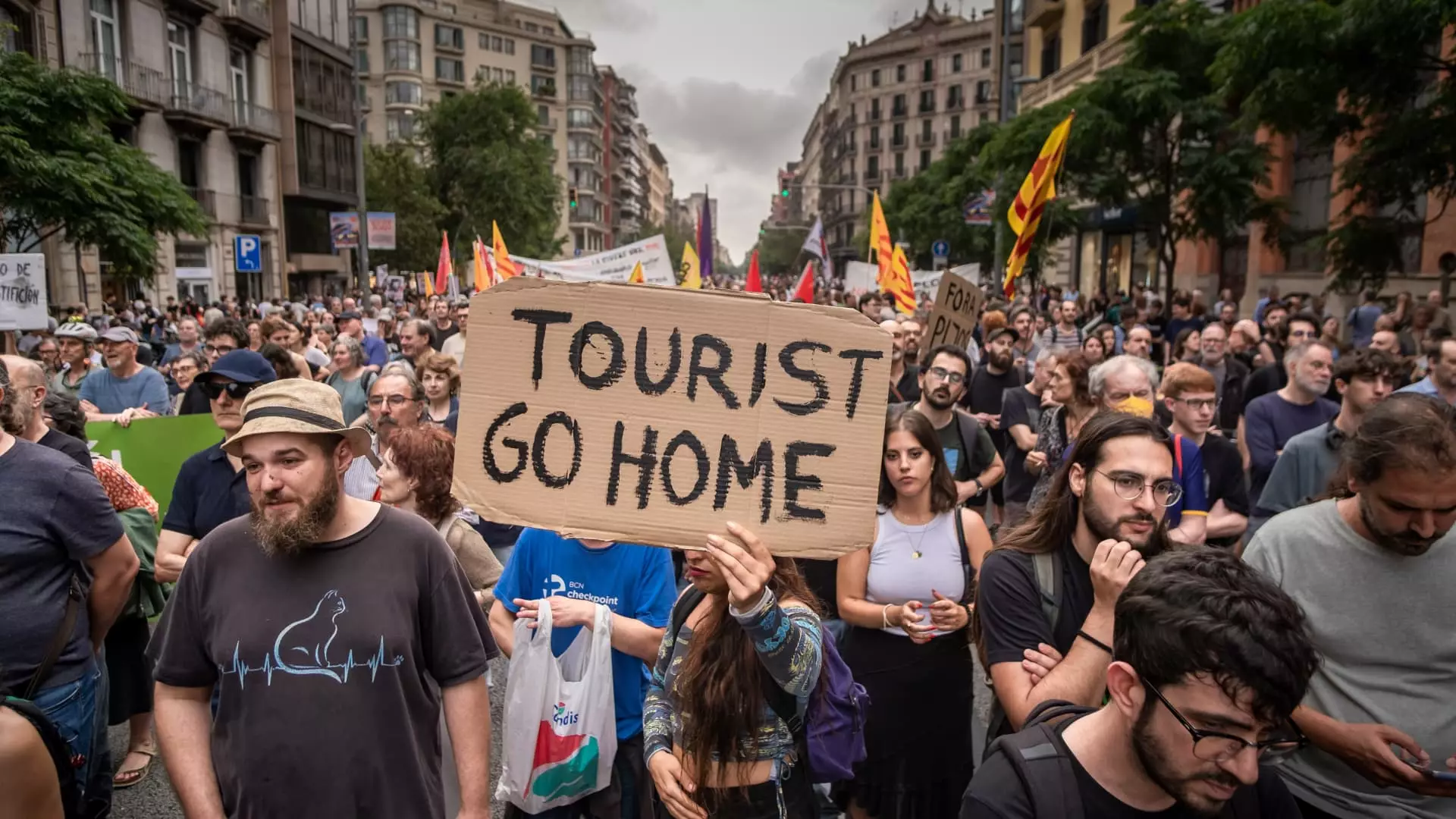On July 6, a significant number of individuals took to the streets of Barcelona in a high-profile protest against the city’s overwhelming tourist influx. The demonstrators’ rallying cry, “Tourists go home!” resonated through the city, highlighting a growing frustration among locals who feel submerged under the burden of mass tourism. This public display of discontent reflects a deeper sentiment in many popular destinations where the balance between local life and tourism is increasingly skewed.
In stark contrast, just over a month after the protests, Spain’s tourism board sent out an optimistic mass email, inviting travelers with the enticing slogan: “Spain: the summer you’ll want to repeat every year… We can’t wait to see you!” This discrepancy underscores the complexities faced by cities like Barcelona, where tourism is a double-edged sword—essential for local economies but troubling for residents’ quality of life.
Despite the uproar, data from the summer season indicates that many tourists remained undeterred by the protests. According to Spain’s National Statistics Institute, international arrivals surged in August to approximately 10.9 million, marking a substantial 7% increase year-on-year. This highlights a critical fact: while protests can capture media attention and local sentiments, they often have little impact on the broader tourism trends, especially in a country renowned for its cultural and historical allure.
Among the destinations most visited during this period were the Balearic Islands and Catalonia, where protests were notably organized. In August, around 2.4 million international visitors flocked to the Balearic Islands, signaling a 4% increase, while Catalonia, home to Barcelona, saw around 2.3 million tourists—a 6% rise. A survey by Mallorca’s tourism board revealed that a staggering 89% of American travelers were either unaware of the protests or were unconcerned about them, suggesting a disconnect between local sentiments and the experiences of international travelers.
While the immediate aftermath of the protests did manifest in a dip in hotel bookings—falling by 23% within a week—this downturn proved to be fleeting. Bookings rebounded notably within six weeks, demonstrating that the impact of public demonstrations on tourism can be short-lived. This leads one to ponder the transient nature of protest-related sentiments and how such movements may not resonate deeply with the very visitors they aim to influence.
Daniel Pardo Rivacoba, a key figure in the Assembly of Neighbourhoods for Tourism Degrowth, articulated that the protest was merely a chapter in a larger narrative advocating for 13 specific demands. These include calls to rethink airport expansions and the proliferation of cruise terminals, both of which threaten to exacerbate the strain on the city’s resources and its residents’ quality of life.
Barcelona’s city council responded to public outcry with a 135-page document titled “Government Measure For Tourism Management 2024-2027,” which outlined various strategies aimed at better balancing tourism with local needs. Despite this, Rivacoba critiqued the efforts as superficial, suggesting they merely offer “cosmetic speeches and social washing.” The city’s strategy to implement a tourism surcharge may collect revenue but does little to effectively address the root problems of overtourism.
As cities worldwide grapple with the challenges posed by mass tourism, many are turning their attention to managing visitor flows through advanced technological solutions. Strategies such as mobile tracking and real-time crowd management have gained traction, yet true advocates for responsible tourism, like Rivacoba’s organization, argue that these measures alone will not suffice. They advocate for a more fundamental rethinking of how many tourists cities can sustainably accommodate.
Public Sentiment Shifts and Future Mobilization
Despite the resounding numbers reported in favor of tourism, public sentiment in Barcelona appears to be shifting. Rivacoba described a growing recognition that the city’s tourism model has spiraled beyond control, leading more residents to embrace the idea of action against it. He noted the increasing support from journalists and the media, which have begun to highlight the adverse effects of overtourism—an encouraging sign that awareness is rising.
Looking to the future, Rivacoba hinted at continued mobilization for further protests, reaffirming the notion that collective local action constitutes a powerful force for change. In a landscape where travel companies and government bodies hold significant sway over tourism policies, Rivacoba’s perspective suggests that grassroots movements may yet carve out a significant role in redefining the narrative of tourism in Barcelona.
The Role of Stakeholders in the Resolution
Industry leaders, like Booking Holdings’ CEO Glenn Fogel, stress that alleviating overtourism cannot rest solely on protesters. Rather, it requires a collaborative effort involving various stakeholders—governments, residents, and businesses alike. The nuances of managing tourism demand a concerted strategy, ensuring that the economic benefits do not overshadow the well-being of those who call the destination home.
In the face of ongoing challenges, the path forward for Barcelona remains complex. Yet the protests, data, and shifting attitudes illustrate a critical juncture that could set the stage for a more sustainable approach to tourism. As local sentiments evolve and awareness grows, the ongoing dialogue about the nature of tourism in Barcelona may lead to substantive changes in the years to come.

